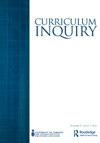“It’s really geniuses that live in the hood”: Black urban youth curricular un/makings and centering Blackness in slavery’s afterlife
IF 1.6
3区 教育学
Q2 EDUCATION & EDUCATIONAL RESEARCH
引用次数: 11
Abstract
Abstract Curriculum within the US was birthed in a context of antiblackness and continues to operate as anti-Black through imagining Black youth as less than and uneducable. However, despite the ways educational space has historically worked to image Black children and communities through deficit lenses, the creation of non-traditional Black curricular spaces has long served as a strategy of resistance. In this paper, I examine the ways Black urban youth leveraged a co-created non-traditional curricular space, grounded in centering Blackness to make sense of their educational experiences. I draw from an academic yearlong (2016–2017) critical ethnography, centered in Black Critical Theory (BlackCrit), to examine what is revealed about Black living and learning and curriculum, through centering Blackness in a non-traditional curricular space. Theoretically framed through BlackCrit and Sharpe’s (2016) concept of wake work, I analyze critical literacy artifacts and interview data to examine how centering antiblackness, a strength-based positioning, facilitated Black curricular un/makings that worked to: 1) center Black empowerment and 2) affirm Black knowledge. I use the term curricular un/makings to represent the ways the Black youth leveraged their life-worlds to disrupt or abandon nation-state curriculum (unmake anti-Black curricular space) to compose new ideations of curriculum and curricular space (make curriculum anew by centering Blackness). Black curricular un/makings represent the intentional process of deconstructing anti-Black curriculum through an unapologetic centering of a Black ethos.“生活在兜帽里的真是天才”:黑人城市青年课程的取消和以奴隶制的死后黑人为中心
美国的课程是在反黑人的背景下诞生的,并且通过将黑人青年想象成不受教育的人而继续作为反黑人的方式运作。然而,尽管教育空间在历史上一直通过赤字镜头来塑造黑人儿童和社区的形象,但创造非传统的黑人课程空间长期以来一直是一种抵抗策略。在本文中,我研究了黑人城市青年利用共同创造的非传统课程空间的方式,以黑人为中心,使他们的教育经历变得有意义。我从为期一年的学术(2016-2017)批判民族志中汲取灵感,以黑人批判理论(BlackCrit)为中心,通过在非传统课程空间中以黑人为中心,研究黑人生活、学习和课程所揭示的内容。通过BlackCrit和Sharpe(2016)唤醒工作概念的理论框架,我分析了关键的识字文物和访谈数据,以研究如何以反黑人为中心,一种基于力量的定位,促进了黑人课程/制作,这些课程/制作有助于:1)集中黑人赋权,2)肯定黑人知识。我用“课程制造”这个词来表示黑人青年利用他们的生活世界来破坏或放弃民族国家课程(unmake anti-Black的课程空间),从而构成新的课程和课程空间(以黑人为中心重新制造课程)。黑人课程设计代表了通过以黑人精神为中心的毫无歉意地解构反黑人课程的有意过程。
本文章由计算机程序翻译,如有差异,请以英文原文为准。
求助全文
约1分钟内获得全文
求助全文
来源期刊

Curriculum Inquiry
EDUCATION & EDUCATIONAL RESEARCH-
CiteScore
3.10
自引率
17.60%
发文量
37
期刊介绍:
Curriculum Inquiry is dedicated to the study of educational research, development, evaluation, and theory. This leading international journal brings together influential academics and researchers from a variety of disciplines around the world to provide expert commentary and lively debate. Articles explore important ideas, issues, trends, and problems in education, and each issue also includes provocative and critically analytical editorials covering topics such as curriculum development, educational policy, and teacher education.
 求助内容:
求助内容: 应助结果提醒方式:
应助结果提醒方式:


